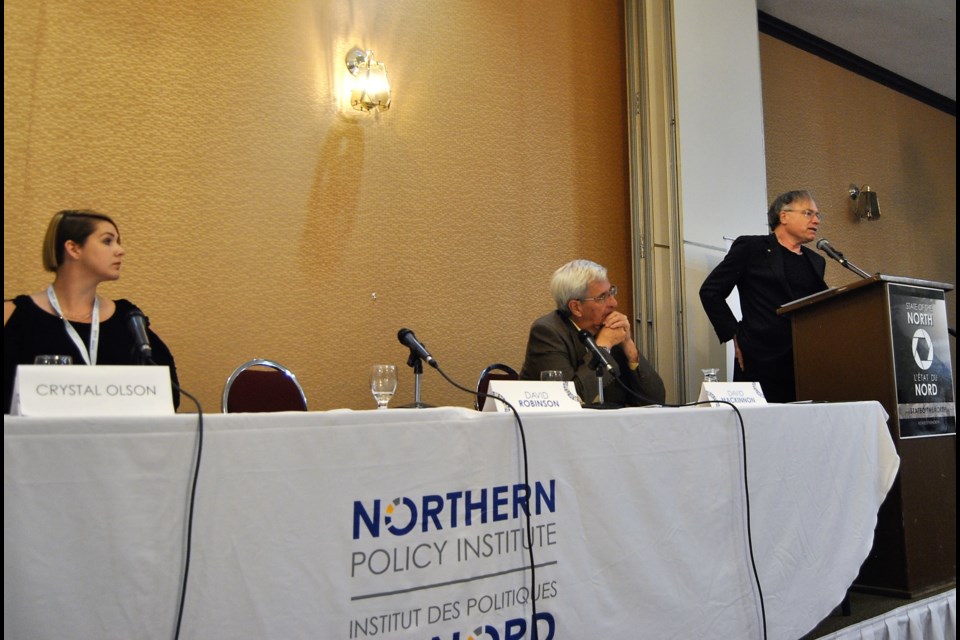TIMMINS — Striving for greater autonomy for northern Ontario comes with risk, says an expert who spoke at a conference on the state of the region.
Devolved jurisdictions like Greenland, the Faroe Islands and Iceland have not succeeded as proponents expected, said David MacKinnon, a former senior civil servant with the Ontario government’s Ministry of Finance who has also worked in Nova Scotia.
“The question to ask is whether devolution of power will lead to improved governance, or perhaps the opposite,” MacKinnon told conference-goers at a two-day conference held in Timmins by the Northern Policy Insitutute. “Devolution does have serious risks in my view.”
“Devolution could lead to more local introspection to find solutions and I think that is the very last thing Northern Ontario needs,” MacKinnon asserted.
Competing visions for the future of Northern Ontario were debated at the conference. A report card on the north was delivered by the president and CEO of the Northern Policy Institute Charles Cirtwill to get things started.
MacKinnon was joined by professor David Robinson, of Laurentian University in leading the discussion on two approaches to improving governance for Northern Ontario.
“For 50 years we have been hearing the same consistent message from Northern Ontario- we need to get the government’s attention, we need more government investment, but these demands only have a partial relationship to the world we live – this approach leads to isolated thinking,” MacKinnon said.
MacKinnon pointed out that northern Ontario is lagging badly in economic growth compared to other northern economies around the world.
That is because northern Ontario is still too focused on resource based commodities export instead of pursuing non-resource economic activities such as dot.com and web-based economics.
“One form of devolution of power that will work in northern Ontario is the formation of regional government,” MacKinnon said. “Northern Quebec has two regional governments and Southern Ontario has many.
MacKinnon said a benefit of regional government is that it helps build economies of scale and sophistication in the delivery of public services and a more united voice for the region than exists today.
“The former mayor of North Bay wrote in an article in the Globe and Mail about the lack of cooperation between communities in northern Ontario, regional government help to achieve common goals,” he added.
Robinson, a professor of economics at Laurentian University, pointed out that one of the reasons northern Ontario is experiencing difficulties is precisely because decisions are being made on its behalf by a provincial government that is dominated by representatives from southern Ontario.
“The reason northern Ontario’s economy is lagging other northern regions is precisely because it does not control decision making on matters that have an economic impact,” Robinson said. “Queen’s Park makes the decisions”
“For example, Manitoba established a university in its north in the 19th Century, but in Ontario it took until the 1960s to start up a Northern university. The decision was made in Queen’s Park,” said Robinson. “Queen’s Park is keeping the University of Toronto’s mining school when it could be more successful in northern Ontario."
Robinson spoke about the success of the Sudbury Area Mining Supply and Services Association (SAMSSA) in promoting northern Ontario mining and how Queen’s Park disagreed with its development.
Greater autonomy and decision-making power will lead to better decisions by and for the people living in northern Ontario.
In presenting his argument for greater autonomy, Robinson referenced Adam Smith, the 18th Century economist who saw the importance of colonies for developing the homeland.
“Colonies are necessary to rapidly advance the wealth of society,” Robinson quoted Smith. “The way to do this is by clearing sparsely populated lands of its inhabitants to make way for European settlers and that is precisely what happened in northern Ontario.”
“The South had a system of governance, the north was given away to the cousin of the King (Rupert’s Land) and controlled by a private company — the Hudson Bay Company,” said Robinson.
“The way forward for northern Ontario is for it to make its own economic decisions,” Robinson argued. “The United States is an example of how a colony can succeed once it makes its own decisions.”
“Without devolution of power to northern Ontario there will be no hope for the future,” Robinson said.
On the first day of the conference, Michael Gravelle, Minister of Northern Development and Mines, provided a rundown of the province of Ontario's investment in Northern Ontario.
On Thursday, Victor Fedeli, Progressive Conservative MP for North Bay, focused his comments on the threat posed by the Trump administration’s America First policies, and how policy needs to reduce costs and red tape to Ontario competitive.
Gilles Bisson the MPP for Timmins-James Bay followed with the NDP perspective.
“We have done some good things in the north, but we must be able to strive to keep what we have achieved and plan for the future,” Bisson said.
Bisson said the north should have more control over immigration so more immigrants settle in Northern Ontario instead of Montreal and Toronto.
He also pointed to the need for better partnering with the indigenous communities and educational training.
Grand Chief Jonathan Wesley provided the Indigenous people’s perspective. He said that Indigenous people are ready to partner with Ontario but it is important to respect Indigenous rights to share in revenue and be consulted prior to economic activity on Indigenous lands.
State of the north brings together decision makers, community leaders, experts and innovators to explore the state of northern Ontario from an economic, social, and environmental perspective.
The Northern Policy Institute updates the state of north by reviewing environmental, social and economic indicators that we will define and select in partnership with our communities.
This year’s theme is ‘Responding to Northern Ontario’s Demographic Shift’ with a declining, aging population and in an increasing indigenous population.
